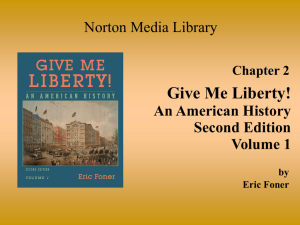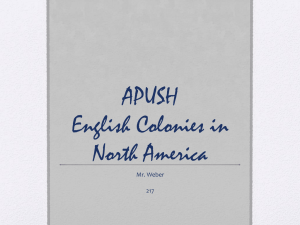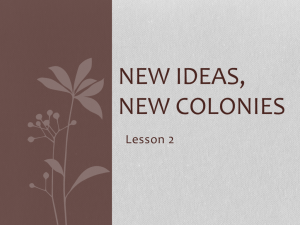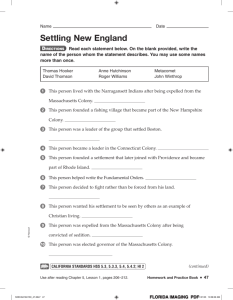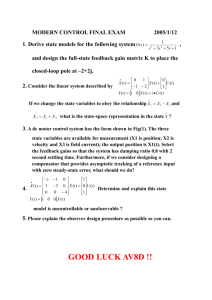Early English Colonization
advertisement
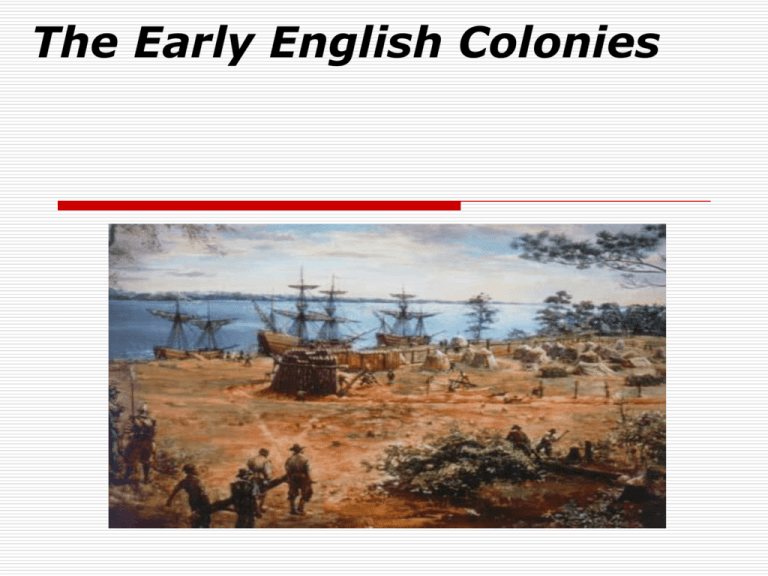
The Early English Colonies I. England and the New World Reasons for England’s late entry Protracted religious strife Continuing struggle to subdue Ireland Awakening of English attention to North America Early ventures Humphrey Gilbert’s failed Newfoundland colony Walter Raleigh’s failed Roanoke colony I. England and the New World (cont’d) Impetus for North American colonization National rivalry Opposition to (Spanish) Catholicism Spain’s attempted invasion of England Desire to match Spanish and French presence in the New World I. England and the New World (cont’d) B. Awakening of English attention to North America 2. Impetus for North American colonization b. Sense of divine mission Image of Spanish brutality in the New World ( The Black Legend- Las Casa) England’s self-conception as beacon of freedom I. England and the New World (cont’d) b. Material possibilities Prospects for trade-based empire in North America Solution to English social crisis Chance for laboring classes to attain economic independence I. England and the New World (cont’d) C. English social crisis of late sixteenth century Roots of Population explosion Rural displacement Elements of Urban overcrowding Falling wages Spread of poverty Social instability I. England and the New World (cont’d) Government answers to Punishment of dispossessed Dispatching of dispossessed to the New World II. Overview of seventeenthcentury English settlement in North America Challenges of life in North America Magnitude of English emigration Chesapeake New England Middle colonies Indentured servitude Similarities to slavery Differences from slavery II. Overview of seventeenth-century English settlement in North America Significance of access to land As As As As basis of English liberty lure to settlement resource for political patronage source of wealth II. Overview of seventeenthcentury English settlement in North America (cont’d) E. Englishmen and Indians Displacement of Indians Preference over subjugation or assimilation Limits of constraints on settlers Recurring warfare between colonists and Indians Trading Impact of trade and settlement on Indian life Joint Stock Company A corporate venture to settle Virginia – The Virginia Company Merchants formed the company for a profit, but the King also wanted to Christianize the natives III. Settling of the Chesapeake Virginia 1. Initial settlement at Jamestown 2. Rocky beginnings High death rate Inadequate supplies Inadequate labor III. Settling of the Chesapeake (cont’d) 3. Virginia Company measures to stabilize colony Forced labor Headright system 2 grants for colonist already there 1 grant per new male settler that paid their own way “Charter of grants and liberties” 4. Indians and Jamestown settlers Initial cooperation and trade III. Settling of the Chesapeake (cont’d) a. Key figures in early Indian-settler relations Powhatan John Smith Pocahontas John Rolfe b. Sporadic conflict c. War of 1622 Opechancanough attack on settlers Settlers’ retaliation Aftermath Settling of the Chesapeake (cont’d) e. War of 1644 Defeat of Opechancanough rebellion Removal of surviving Indians to reservations f. Continuing encroachment on Indian land III. Settling of the Chesapeake (cont’d) 5. Take-off of tobacco cultivation Introduction and spread Effects Issuance of royal colonial charter Rise of tobacco planter elite Spread of settler agriculture Rising demand for land and labor III. Settling of the Chesapeake (cont’d) Virginia 6. Emerging strata of white Virginia Wealthy gentry Small farmers Poor laborers Indentured servants Free 7. Women settlers Quest for Status of Hardships Richard Frethorne An Indentured Servants letter Home Richard Frethorne “My most humble duty remembered to you, hoping in god of your good health, as I myself am at the making hereof. This is to let you understand that I you child am in a most heavy case by reason of the country, [which] is such that it causeth much sic kness, [such] as the scurvy and the bloody flux and diverse other diseases, which maketh the body very poor and weak. And when we are sick there is nothing to comfort us; for since I came out of the ship I never ate anything but peas, and loblollie (that is, water gruel). As for deer or venison I never saw any since I came into this land. “ Richard Frethorne “For we came but twenty for the merchants, and they are half dead just; and we look every hour when two more should go. Yet there came some four other men yet to live with us, of which there is but one alive; and our Lieutenant is dead, and [also] his father and his brother. And there was some five or six of the last year’s twenty, of which there is but three left, so that we are fain to get other men to plant with us; and yet we are but 32 to fight against 3000 if they should come.” Richard Frethorne “And I have nothing to comfort me, nor is there nothing to be gotten here but sickness and death, except [in the event] that one had money to lay out in some things for profit. But I have nothing at all – no, not a shirt to my back but two rags (2), nor clothes but one poor suit, nor but one pair of shoes, but one pair of stockings, but one cap, [and] but two bands [collars]. My cloak is stolen by one of my fellows, and to his dying hour [he] would not tell me what he did with it; but some of my fel lows saw him have butter and beef out of a ship, which my cloak, I doubt [not], paid for. So that I have not a penny, nor a penny worth, to help me too either spice or sugar or strong waters, without the which one cannot live here.” Richard Frethorne “Any eating meat will yield great profit. Oil a nd vinegar is very good; but, father, there is great loss in leaking. But for God’s sake send beef and cheese and butter, or the more of one sort and none of another. But if you send cheese, it must be very old cheese; and at the cheesemonger’s you may bu y very food cheese for twopence farthing or halfpenny, that will be liked very well. I hope all my brothers and sisters are in good health, and as for my part I have set down my resolution that certainly will be; that is, that the answer of this letter will be life or death to me. Therefore, good father, send as soon as you can; and if you send me any thing let this be the mark.” Richard Frethorne What problems were Richard facing? What was his solution? Was the New World a promise land for Frethorne? III. Settling of the Chesapeake (cont’d) B. Maryland Similarities to Virginia colony Distinctive features Proprietary structure Cecilius Calvert Absolute power of proprietor vs. rights of colonists Resulting conflict Religious and political tensions Calvert’s Catholic leanings vs. settlers’ Protestant leanings Reverberations of English Civil War IV. Settling of New England Puritanism Emergence in England Variations within Common outlooks Central importance of the sermon John Calvin’s ideas The elect and the damned Salvation Worldly behavior Zealousness IV. Settling of New England (cont’d) B. Puritan separatists Growth under Charles I Aims Conceptions of Freedom Denunciation of “natural liberty” Embrace of “moral liberty” IV. Settling of New England (cont’d) B. Founding of Plymouth Colony The Pilgrims Arrival at Plymouth Mayflower Compact Rocky beginnings Help from Indians Thanksgiving New England Plymouth Colony 1620 Separatist – against the Church of England Governed by Mayflower Compact 1st year lost half of the adults, most children survived Easy going with land. Plymouth Colony Came as family units Here to stay Few Indian problems Government Representative self government Broad political rights No government interference in religious matters The Great Migration Persecution in England led to an exodus of 900 Puritans (wanted to purify the Church of England Led by John Winthrop Massachusetts Bay Colony – Boston – Build a “City on the Hill” A new Jerusalem. IV. Settling of New England (cont’d) E. Government and society in Puritan Massachusetts Attitudes toward individualism, social unity IV. Settling of New England (cont’d) F. Government and society in Puritan Massachusetts 2. Organization of towns Self-government Civic Religious Subdivision of land Institutions 3. Colonial government Emphasis on colonial autonomy Principle of consent “Visible Saints” Settling of New England (cont’d) G. New Englanders divided Prevailing Puritan values Emphasis on conformity to communal norms Intolerance of individualism, dissent IV. Settling of New England (cont’d) G.New Englanders divided 2. Roger Williams Critique of status quo Banishment Establishment of Rhode Island Religious toleration Democratic governance 3. Other breakaway colonies Hartford New Haven Settling of New England (cont’d) 4. Anne Hutchinson Challenge to Puritan leadership Challenge to gender norms Trial and banishment IV. Settling of New England (cont’d) H. Puritans and coastal Indians Balance of power Settler’s numerical supremacy Indians’ lack of central political structure Settlers’ views of Indians As savages As dangerous temptation As object to be removed Settling of New England (cont’d) Rising frontier tensions Settler war with and extermination of Pequots Aftereffects of Pequot War Opening of Connecticut River valley to white settlement Intimidation of other Indians Affirmation of Puritan sense of mission King Phillip's War Changes to Indian Society European Goods in exchange for furs Drink Weapons Pots Warfare Iroquois allied with the British The rest in the North sided with the French Constant warfare Tribes from the Ohio River area displaced to Wisconsin Kickapoo’s – started in Ohio end up in Mexico through displacement. IV. Settling of New England (cont’d) I. New England economy Economic motives behind New England settlement Aspiration for a “competency” Land ownership Craft status Aspiration for mercantile success Blending of religious and profit motives New England Economy Agriculture – small farms – dominant occupation Soil/climate limiting Cash crops sold internally – not for export Cottage industries (textiles) part of the economy New England Economy Fishing – catch sold primarily in West Indies Wood products – for exports and domestic use Shipping and shipbuilding New England Economy Some industry (Saugus Iron Works) A strong Merchant class (Boston, Hartford) New England’s economy not compatible to mercantilist policies New England’s Impact on the American Identity The Puritan Impact America as an ideal (‘city upon a hill”) Education – colleges (Harvard 1636); public education laws Puritan work ethic Intolerance/witch trials The Salem Witch Trails With religion came the offshoots of evil lurking around Indian in the forest Salem mass hysteria 175 arrest 20 executions Most women were property owners. Mercantilism An economic doctrine that flourished in Europe from the sixteenth to the eighteenth centuries. Mercantilists held that a nation's wealth consisted primarily in the amount of gold and silver in its treasury. Accordingly, mercantilist governments imposed extensive restrictions on their economies to ensure a surplus of exports over imports Mercantilism The colony exist for the good of the mother country American colonies were to produce raw material for the manufacturers in England to produce manufactured goods that would be sold elsewhere and the colonies Navigation Acts All trade had to be conducted using English shipping European exports had to pass through England before going to the colonies Colonist broke these laws and flouted smuggling “Salutary (Healthy) Neglect” Royal Government relaxes supervision of internal colonial affairs The government concerned only about the defense and trade Local government grows in importance
